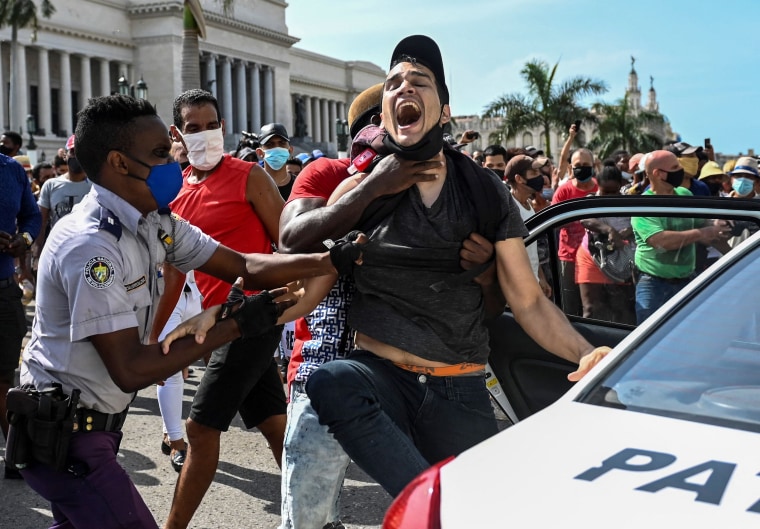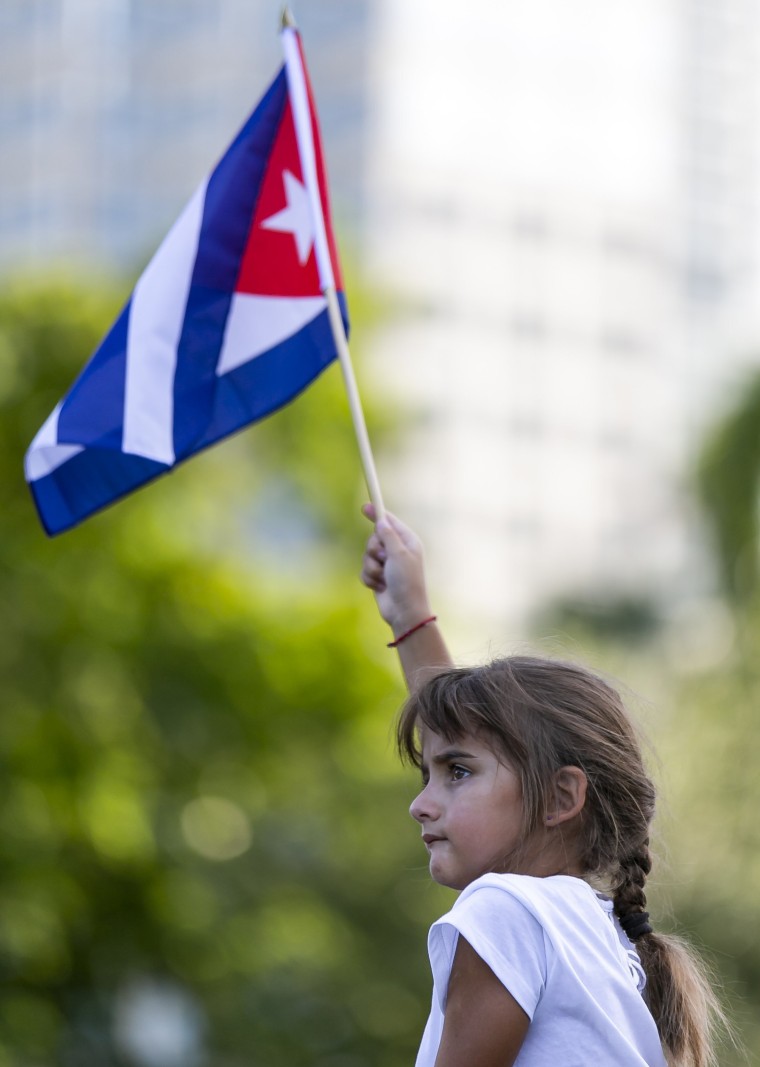MIAMI — Belkis Gutiérrez, 54, is constantly on her phone looking at videos from Cuba that show people's discontent with the government following the historic protests that rocked the communist island several weeks ago.
Gutiérrez, who supported President Joe Biden in the 2020 election, said she wants to see more bold action from the administration toward Cuba following the arrests of protesters and worries over food shortages and rising Covid-19 cases.
“I was expecting something more forceful than just sanctioning Cuban officials who don’t travel to the U.S. anyway,” said Gutiérrez, who left Cuba two decades ago and has close relatives on the island.
Asked what she would prefer, Gutiérrez said Biden should build an international coalition that can travel to Cuba and hold a dialogue with the government to demand concrete changes from them.
Many Cuban Americans want to see bolder action against the Cuban government, with demands ranging from military intervention to lifting the decadeslong embargo.
Biden is in a tricky situation. The Cuba sanctions program is already the most comprehensive one administered by the U.S. Office of Foreign Assets Control, giving Biden little room for additional sanctions. Since the protests, Biden’s administration has sanctioned three Cuban officials and two entities it says were involved in the crackdown — the Cuban National Revolutionary Police and an elite brigade of government forces known as the "Black Berets." But these sanctions are largely symbolic. Earlier this year, the Biden administration maintained Cuba on the list of countries that aren’t cooperating fully with U.S. efforts to fight terrorism, surprising many — including those in Cuba’s government.
Since that moment and especially after the protests, the rhetoric by officials in both countries has intensified, with the United States condemning human rights abuses in Cuba and officials on the island accusing the U.S. government of fomenting the unrest. Even after Cuba’s embassy in Paris was attacked with gasoline bombs, Cuba’s government blamed the United States and “the continuous campaigns against our country.”
Jason Poblete, a Washington, D.C., attorney and Republican who has been critical of Biden’s response, advocated for stricter measures against Cuba’s government, including more restrictions on the decadeslong embargo and on sanctions.
"July 11 is perhaps a once-in-a-generation event," Poblete said. "Stakeholders should be reaching across party and ideological lines to develop a new policy."

Last week, Biden met with a group of Cuban American elected officials and community leaders to discuss the U.S. response. Some — on the left and the right — criticized the meeting, saying the group didn't encompass how all Cuban Americans feel. Others said the administration should be listening to Cubans on the island rather than those here.
Ric Herrero, executive director of the Cuba Study Group, which advocates for more engagement between the two countries, was at the recent White House meeting and highlighted "practical steps" the administration can take, especially to enhance internet access, which is something many see as crucial to giving the Cuban population more information as well as more freedom of expression.
Herrero said the steps include "allowing cloud-based subscription services, online payment and peer-to-peer platforms to operate in Cuba that are currently prohibited due to U.S. sanctions," as other more complex methods, like high-altitude balloons to expand internet access, are studied.
Herrero thinks measures that former President Donald Trump took against Cuba — like limiting travel, remittances and downsizing the embassy — are harmful "because what you’re trying to do is help strengthen the people."
At the meeting, there was a diversity of opinion from the right and the left, according to Carmen Pelaez, a filmmaker and activist who was part of the group of around nine Cuban Americans.
"You had every perspective on U.S.-Cuba policy represented," Pelaez said, "but the focus was on how best to support the Cuban people."
In Florida, foreign policy is domestic politics
While the protests in Cuba have subsided, in Miami the momentum continues. Cuban Americans have been rallying in support of them in Miami and Washington, D.C. Cars drive around Miami with Cuban flags, while reggaeton and salsa songs calling for freedom in Cuba play on the radio. The emotion that Cuban Americans feel after hearing the word “freedom” chanted in the streets of Cuba is still palpable in conversations.
For Biden, the stakes are high. Trump won Florida, traditionally a swing state and the largest one in the country, by about 3 percentage points, reversing gains Democrats had made when former President Barack Obama won the Cuban American vote in 2012. A majority of Cuban Americans in 2020 voted for Trump, with the biggest shift in support for Trump coming from other Latino voter groups from countries that have been impacted by socialism or Marxist movements and therefore support a hard-line stance against Cuba.
These groups are all keeping a close eye on how Biden responds to Cuba, making this a sort of litmus test for the president.
Trump’s administration meshed together policy on Cuba, Venezuela and Nicaragua, often taking measures against Cuba for supporting President Nicolás Maduro in Venezuela as the country spiraled into economic crisis.
At a recent rally in Miami’s Bayfront Park, hundreds gathered to call for freedom for Cuba — and Venezuela and Nicaragua as well.

Following the protests, Miami Mayor Francis Suarez, a Republican, called for exploring air strikes and military intervention against Cuba.
Republicans have capitalized on events in Cuba. Two days after the protests, Florida Gov. Ron DeSantis held a roundtable in Miami to address concerns, the GOP held a town hall at the iconic Versailles restaurant near the Little Havana neighborhood that was hosted by Fox News’ Sean Hannity, and House Republican Leader Kevin McCarthy, of California, launched a Leader’s Advisory Team on Cuba and traveled to Miami this week, not only meeting with Cuban Americans, but also Venezuelans, Nicaraguans, Colombians, and Peruvians - groups who have grappled with socialist governments or movements in their home countries. Cuban American members of congress have also participated in the “freedom” rallies in Miami and Washington, D.C.
“Republicans have turned Cuba pandering into a science,” said Herrero, adding that the demands being made regarding what to do in Cuba are not practical.
"Republicans know this," Herrero said. "And they’re going to continue to hammer away at demands for a military intervention because what they want to do is embarrass Biden."
But Republicans have been notoriously good at actively engaging Cuban Americans and other Latino diasporas. Trump launched his Cuba policy in 2017 with an audience of Cuban Americans in the Little Havana neighborhood of Miami, and visits by administration officials never stopped.
Some Democrats have asked Biden to come to Miami and address Cuban Americans.
Since the protests, Florida Democrats have been forceful in their statements against Cuba’s government, but collectively, their engagement has not reached the scale of Republicans.
Florida Agricultural Commissioner Nikki Fried, the only statewide agency Democrat, who is also running for governor in 2022, has been active, meeting with Cuban American leaders, participating in a Miami protest and repeatedly tweeting about Cuba, calling for freedom.
Both the Democratic National Committee and Nuestro PAC have launched ads targeting Cuban American voters by highlighting Biden's support for Cuban people. Sen. Rick Scott, R-Fla., also released an ad in Florida and Washington, D.C., promising eternal support for protesters in Cuba.
“Republicans and Democrats should be approaching this matter one way: what is best for American interests first, and not the interests of just one state, Florida,” Poblete said.
Follow NBC News Latino on Facebook, Twitter and Instagram.

